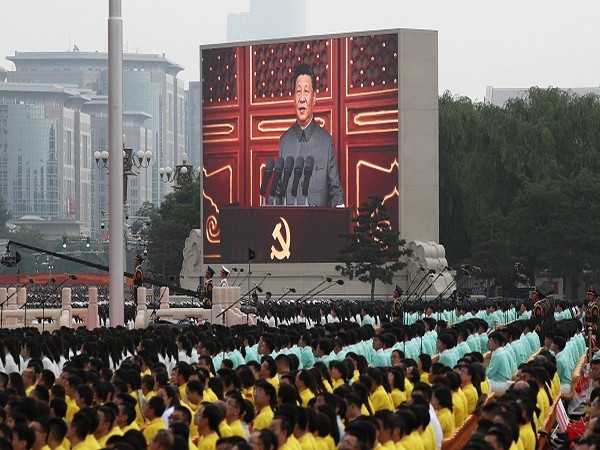
Xi Jinping calls for strengthening jurisdiction on Hong Kong, Macao at CCP centenary address

Beijing [China], July 1 (ANI): As the Chinese Communist Party (CCP) marked 100 years on Thursday, President Xi Jinping stressed on ensuring that the central government exercises overall jurisdiction over Hong Kong and Macao.
Xi, also the chairman of China’s Central Military Commission, made the remarks in a speech at a ceremony marking the centenary of the CCP, Xinhua reported.
“We will stay true to the letter and spirit of the principle of One Country, Two Systems, under which the people of Hong Kong administer Hong Kong, and the people of Macao administer Macao, both with a high degree of autonomy,” he said.
He also highlighted implementing the legal systems and enforcement mechanisms for the two special administrative regions to safeguard national security.
“While protecting China’s sovereignty, security, and development interests, we will ensure social stability in Hong Kong and Macao, and maintain lasting prosperity and stability in the two special administrative regions,” Xinhua quoted Xi as saying.
The CCP is celebrating its 100th anniversary. It was founded in July 1921, in a small room in Shanghai’s then French-controlled district, with a mere 13 people in attendance. Today, it has more than 95 million members, almost 7 per cent of the country’s population, reported CNN.
In the meeting where the CCP was born, only two men were present at the founding of the People’s Republic of China (PRC) – former Presidents Mao Zedong and Dong Biwu. The PRC came into existence on October 1, 1949, after a bloody civil war with nationalist party Kuomintang’s (KMT) leader Chiang Kai-shek. Since its formation, it has been redefining its boundaries, culminating in tensions with its neighbours.
The Chinese government occupied Tibet in 1950, destroying 98 per cent of the monasteries and nunneries, and has ever since tried to control the region. More than 1 million people have been killed in Tibet by Chinese forces. During a meeting, Mao had told the 14th Dalai Lama, that “religion is poison.”
Under Mao’s regime, farmers were made to leave to their fields to make steel for build the machinery required for industrialisation. Despite his promises of a “Great Leap Forward”, a massive famine swept China, devastating the country and killing as many as 30 million people.
Mao also claimed that the groups opposed to communist ideology needed to be cleansed. As a result, mobs of students known as Red Guards attacked people whom they believed to be harbouring imperialist habits. People were tortured, abused, forced to confess and locked in makeshift camps. This ended with Mao’s death in 1976, CNN highlighted.
Under Deng Xiaoping’s regime, China witnessed the worst episode of stifling free speech, when the death of a popular Chinese politician sparked nationwide pro-democracy protests, including the largest one in Tiananmen Square.
On June 4, the Chinese military opened fire on the protesting citizens, killing at least 241 people, although human rights groups have estimated that thousands could have been killed in Beijing alone, according to CNN. The incident led to sanctions and international condemnation.
Since the massacre, the CCP has silenced calls for democracy and civil liberties.
In 2012, Xi took power as the Chinese President and became one of the most powerful leaders of the country. Under his regime, almost two million Uyghurs and other ethnic minorities have been detained in internment camps in Xinjiang since 2017.
After years of denying the existence of the internment camps in Beijing, China in 2019 described the facilities as residential training centres that provide vocational training for Uyghurs, discourage radicalisation and help protect the country from terrorism.
However, several media reports and former detainees have said that those in the camps are detained against their will and subjected to political indoctrination, routinely face rough treatment at the hands of their overseers and endure poor diets and unhygienic conditions in the often overcrowded facilities. Former detainees have also described being subjected to torture, rape, sterilization, and other abuses while in custody.
China has been rebuked globally for cracking down on Uyghur Muslims in Xinjiang, with a handful of countries, the latest being Lithuania, terming the human rights abuses on the ethnic minorities as ‘genocide’.
The communist nation is also under fire after the global COVID-19 pandemic, which has infected and killed millions of people around the world. Many countries have called for a greater investigation in China’s Wuhan to uncover the origins of the deadly virus.
It has also been locked in tensions with its neighbours, such as Japan, India, the Philippines, Vietnam and Taiwan regarding the South China Sea, over which it claims full sovereignty and has passed a controversial law allowing it to fire upon any vessel it sees entering illegally into its waters. (ANI)

















POST COMMENTS (0)